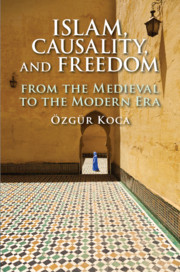Book contents
- Islam, Causality, and Freedom
- Islam, Causality, and Freedom
- Copyright page
- Dedication
- Contents
- Conventions
- Acknowledgments
- Introduction
- 1 Causality in the Early Period
- 2 Toward a Synthesis of Aristotelian and Neoplatonic Understandings of Causality
- 3 Occasionalism in the Middle Period
- 4 The First as Pure Act and Causality
- 5 Light, Existence, and Causality
- 6 The World as a Theophany and Causality
- 7 Continuities and Developments in Sufi Metaphysics
- 8 Toward an Occasionalist Philosophy of Science
- 9 Causality and Freedom in Later Islamic Philosophy
- 10 Occasionalism in the Modern Context
- 11 Islamic Theories of Causality in the Modern Context
- Conclusion
- Bibliography
- Index
4 - The First as Pure Act and Causality
The Case of Ibn Rushd
Published online by Cambridge University Press: 14 May 2020
- Islam, Causality, and Freedom
- Islam, Causality, and Freedom
- Copyright page
- Dedication
- Contents
- Conventions
- Acknowledgments
- Introduction
- 1 Causality in the Early Period
- 2 Toward a Synthesis of Aristotelian and Neoplatonic Understandings of Causality
- 3 Occasionalism in the Middle Period
- 4 The First as Pure Act and Causality
- 5 Light, Existence, and Causality
- 6 The World as a Theophany and Causality
- 7 Continuities and Developments in Sufi Metaphysics
- 8 Toward an Occasionalist Philosophy of Science
- 9 Causality and Freedom in Later Islamic Philosophy
- 10 Occasionalism in the Modern Context
- 11 Islamic Theories of Causality in the Modern Context
- Conclusion
- Bibliography
- Index
Summary
The fourth chapter examines Ibn Rushd’s account of causality. It will be argued that Ibn Rushd’s theory of causality comes very close to Neo-Platonistic participatory accounts, despite his strong Aristotelian tendencies. Ibn Rushd, like Ibn Sīnā, finds the basis of causal efficacy of entities in their participation in the pure existence-act of the First. The most important implication of this understanding of causality is that despite the occasionalist critique that we do not and cannot observe a necessary connection between cause and effect, for Ibn Rushd, the moment one defines existence as pure act, it metaphysically makes more sense to accept causal efficacy of entities, for they participate in the pure existence-act of the First. The chapter also examines the differences between Ibn Sīnā and Ibn Rushd that stem from the latter’s efforts to address some of Ghazālī’s challenges. Ibn Rushd agrees with Ghazālī in that plurality can emanate from the First without emanationist intermediation and solely based on the nature-capacity-form of beings. This view establishes a closer connection between the First’s existence-act and the world than Ibn Sīnā’s metaphysics allows.
- Type
- Chapter
- Information
- Islam, Causality, and FreedomFrom the Medieval to the Modern Era, pp. 83 - 99Publisher: Cambridge University PressPrint publication year: 2020



